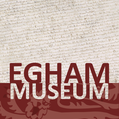The life of Ferdinand Esser (1856- 1928)
Esser was born in the town of Duisburg in the Prussian province of Cleves (made famous in English History for its association with Anne of Cleves, the fourth wife of Henry VIII). Maybe to avoid compulsory military service in the Prussian army, at 17 years old he emigrated from his homeland. Whether or not he intended to stay in England or, like most of his expatriates, his intention had been to travel thence to America, he nevertheless opted to join the small German expatriate community in Victorian England. By the early 1880s, Ferdinand was established as a jeweller and clockmaker at the premises he rented at 61 High Street, Egham. In 1883, he married Mary Ann Howley, a widow twelve years his senior.
He was a person of some influence and authority in his adopted community, offering physical training classes at the Egham Institute and, in 1884, was elected unanimously as sub engineer to the newly formed Egham Volunteer Fire Brigade. This was an officer post which involved maintenance of the fire engine rather than him being engaged in the putting out of fires. Like others in his brigade however, Ferdinand had difficulty in combining his new civic responsibility with the day-to-day pressure of managing his business. Finding it impossible to maintain his initial diligence at compulsory weekly attendance at fire drill, he failed to set an example to the lower ranks. At 51%, Ferdinand had the worst attendance record. At one point he was absent without official leave for three drills in succession and therefore incurred an initial fine of two shillings which he paid. His absences continued to raise concern of the Fire brigade Committee, and it was decided to make an example and a further fine of six shillings was imposed. As the fine was quickly halved, it would seem that the committee had some sympathy for his circumstances, but owing to the incompatibility of combing his fire brigade role with that of his profession, in the spring of 1886 he resigned from the brigade.
Ferdinand never acquired British citizenship and therefore when the First World War broke out in September 1914, his status as a subject of an enemy power became precarious. In 1915, like most German owned businesses in Britain, his shop windows were smashed and although he was by now a long-established resident, he was victim to the mass internment of German adult males. Following his release, he was able to return to his premises on Egham High Street which, in his absence, had been managed by his wife. Unlike so many of his fellow compatriots who left Britain after the War, Ferdinand was able to carry on his business as before, but following the death of his wife in 1922, he left Egham and, in 1928, he died at the age of 72.
